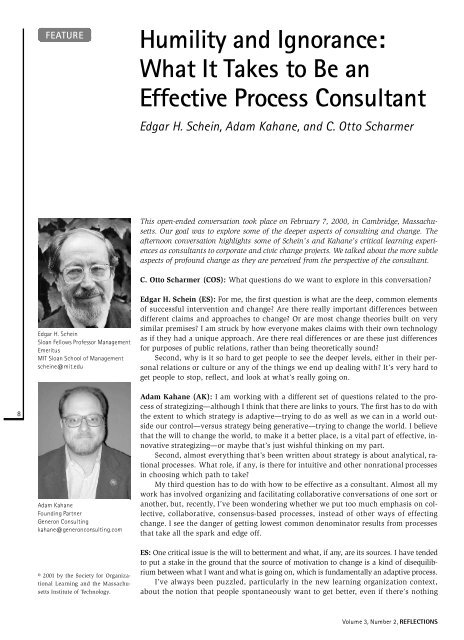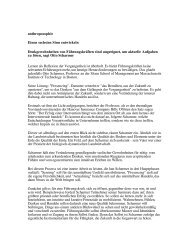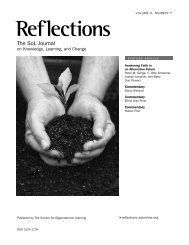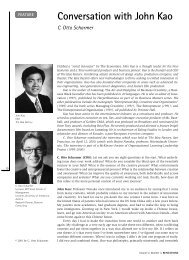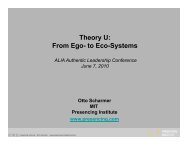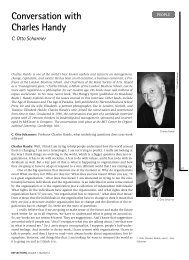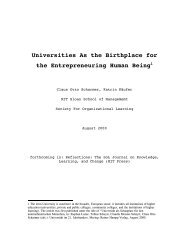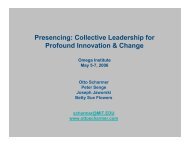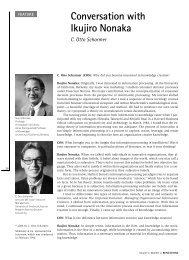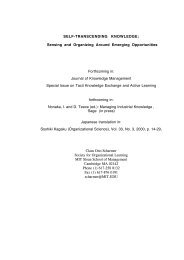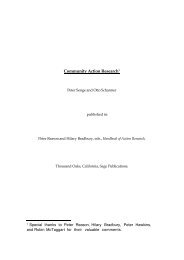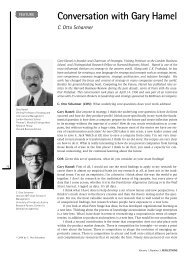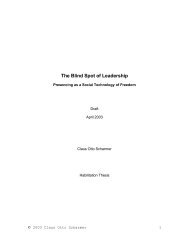What It Takes to Be an Effective Process Consultant - Otto Scharmer
What It Takes to Be an Effective Process Consultant - Otto Scharmer
What It Takes to Be an Effective Process Consultant - Otto Scharmer
You also want an ePaper? Increase the reach of your titles
YUMPU automatically turns print PDFs into web optimized ePapers that Google loves.
FEATURE<br />
Humility <strong>an</strong>d Ignor<strong>an</strong>ce:<br />
<strong>What</strong> <strong>It</strong> <strong>Takes</strong> <strong>to</strong> <strong>Be</strong> <strong>an</strong><br />
<strong>Effective</strong> <strong>Process</strong> Consult<strong>an</strong>t<br />
Edgar H. Schein, Adam Kah<strong>an</strong>e, <strong>an</strong>d C. Ot<strong>to</strong> <strong>Scharmer</strong><br />
This open-ended conversation <strong>to</strong>ok place on February 7, 2000, in Cambridge, Massachusetts.<br />
Our goal was <strong>to</strong> explore some of the deeper aspects of consulting <strong>an</strong>d ch<strong>an</strong>ge. The<br />
afternoon conversation highlights some of Schein’s <strong>an</strong>d Kah<strong>an</strong>e’s critical learning experiences<br />
as consult<strong>an</strong>ts <strong>to</strong> corporate <strong>an</strong>d civic ch<strong>an</strong>ge projects. We talked about the more subtle<br />
aspects of profound ch<strong>an</strong>ge as they are perceived from the perspective of the consult<strong>an</strong>t.<br />
C. Ot<strong>to</strong> <strong>Scharmer</strong> (COS): <strong>What</strong> questions do we w<strong>an</strong>t <strong>to</strong> explore in this conversation?<br />
Edgar H. Schein<br />
Slo<strong>an</strong> Fellows Professor M<strong>an</strong>agement<br />
Emeritus<br />
MIT Slo<strong>an</strong> School of M<strong>an</strong>agement<br />
scheine@mit.edu<br />
Edgar H. Schein (ES): For me, the first question is what are the deep, common elements<br />
of successful intervention <strong>an</strong>d ch<strong>an</strong>ge? Are there really import<strong>an</strong>t differences between<br />
different claims <strong>an</strong>d approaches <strong>to</strong> ch<strong>an</strong>ge? Or are most ch<strong>an</strong>ge theories built on very<br />
similar premises? I am struck by how everyone makes claims with their own technology<br />
as if they had a unique approach. Are there real differences or are these just differences<br />
for purposes of public relations, rather th<strong>an</strong> being theoretically sound?<br />
Second, why is it so hard <strong>to</strong> get people <strong>to</strong> see the deeper levels, either in their personal<br />
relations or culture or <strong>an</strong>y of the things we end up dealing with? <strong>It</strong>’s very hard <strong>to</strong><br />
get people <strong>to</strong> s<strong>to</strong>p, reflect, <strong>an</strong>d look at what’s really going on.<br />
8<br />
Adam Kah<strong>an</strong>e<br />
Founding Partner<br />
Generon Consulting<br />
kah<strong>an</strong>e@generonconsulting.com<br />
Adam Kah<strong>an</strong>e (AK): I am working with a different set of questions related <strong>to</strong> the process<br />
of strategizing—although I think that there are links <strong>to</strong> yours. The first has <strong>to</strong> do with<br />
the extent <strong>to</strong> which strategy is adaptive—trying <strong>to</strong> do as well as we c<strong>an</strong> in a world outside<br />
our control—versus strategy being generative—trying <strong>to</strong> ch<strong>an</strong>ge the world. I believe<br />
that the will <strong>to</strong> ch<strong>an</strong>ge the world, <strong>to</strong> make it a better place, is a vital part of effective, innovative<br />
strategizing—or maybe that’s just wishful thinking on my part.<br />
Second, almost everything that’s been written about strategy is about <strong>an</strong>alytical, rational<br />
processes. <strong>What</strong> role, if <strong>an</strong>y, is there for intuitive <strong>an</strong>d other nonrational processes<br />
in choosing which path <strong>to</strong> take?<br />
My third question has <strong>to</strong> do with how <strong>to</strong> be effective as a consult<strong>an</strong>t. Almost all my<br />
work has involved org<strong>an</strong>izing <strong>an</strong>d facilitating collaborative conversations of one sort or<br />
<strong>an</strong>other, but, recently, I’ve been wondering whether we put <strong>to</strong>o much emphasis on collective,<br />
collaborative, consensus-based processes, instead of other ways of effecting<br />
ch<strong>an</strong>ge. I see the d<strong>an</strong>ger of getting lowest common denomina<strong>to</strong>r results from processes<br />
that take all the spark <strong>an</strong>d edge off.<br />
© 2001 by the Society for Org<strong>an</strong>izational<br />
Learning <strong>an</strong>d the Massachusetts<br />
Institute of Technology.<br />
ES: One critical issue is the will <strong>to</strong> betterment <strong>an</strong>d what, if <strong>an</strong>y, are its sources. I have tended<br />
<strong>to</strong> put a stake in the ground that the source of motivation <strong>to</strong> ch<strong>an</strong>ge is a kind of disequilibrium<br />
between what I w<strong>an</strong>t <strong>an</strong>d what is going on, which is fundamentally <strong>an</strong> adaptive process.<br />
I’ve always been puzzled, particularly in the new learning org<strong>an</strong>ization context,<br />
about the notion that people spont<strong>an</strong>eously w<strong>an</strong>t <strong>to</strong> get better, even if there’s nothing<br />
Volume 3, Number 2, REFLECTIONS
wrong, that there is in us all a will <strong>to</strong> improve. I have a hard time seeing that in my experience.<br />
I wonder whether you could say a bit more about what you see <strong>to</strong> be the nature<br />
of that will <strong>to</strong> betterment <strong>an</strong>d where it comes from?<br />
AK: I wasn’t talking about the will <strong>to</strong> personal betterment but rather about the will <strong>to</strong><br />
societal betterment: people being unhappy with the state of their world <strong>an</strong>d having energy<br />
<strong>to</strong> try <strong>to</strong> make it better. I guess that, in a way, this fits your adaptive construction.<br />
<strong>What</strong> I’ve noticed is that groups that are, explicitly or implicitly, working <strong>to</strong> make<br />
their world better off seem <strong>to</strong> have a greater <strong>an</strong>d deeper energy <strong>an</strong>d creativity th<strong>an</strong><br />
groups working only <strong>to</strong> make themselves better off.<br />
COS: C<strong>an</strong> you give some context? <strong>What</strong> would be <strong>an</strong> example?<br />
AK: The examples that stimulated my thinking in this area are the groups of civic leaders<br />
I’ve worked with in South Africa, Guatemala, Colombia, Cyprus, <strong>an</strong>d elsewhere.<br />
These are projects in which politici<strong>an</strong>s, activists, businesspeople, trade unionists, academics,<br />
clergy, guerrillas, indigenous people, <strong>an</strong>d other sec<strong>to</strong>ral leaders from across m<strong>an</strong>y<br />
org<strong>an</strong>izations have gotten <strong>to</strong>gether <strong>to</strong> try <strong>to</strong> address the messed-up situations in their<br />
countries. <strong>What</strong> I’ve noticed is that these groups almost always exhibit greater energy,<br />
creativity, openness, <strong>an</strong>d hard work th<strong>an</strong> do groups of leaders drawn from a single org<strong>an</strong>ization—say,<br />
a typical corporate m<strong>an</strong>agement team. I’m wondering whether there’s <strong>an</strong><br />
obvious source of energy at work here that we’re overlooking—that by choosing <strong>to</strong> ignore<br />
or assume away the will <strong>to</strong> societal betterment, we’re ignoring a vital possible driver<br />
of ch<strong>an</strong>ge within single org<strong>an</strong>izations as well.<br />
ES: In terms of what a consult<strong>an</strong>t does, it strikes me that that question raises a very clear<br />
choice. We encounter org<strong>an</strong>izations with org<strong>an</strong>izational problems <strong>an</strong>d we encounter individuals<br />
who have hopes <strong>an</strong>d dreams of ch<strong>an</strong>ging the world. The implication of what<br />
you’re saying is that we pick the org<strong>an</strong>ization as the client, instead of the individuals, <strong>an</strong>d<br />
say <strong>to</strong> those individuals, let me see if I c<strong>an</strong> help you be more potent as <strong>an</strong> individual or<br />
leader. We don’t pick the leaders <strong>to</strong> be our clients; we pick the social community or the<br />
org<strong>an</strong>ization <strong>an</strong>d rationalize that its interests have <strong>to</strong> be addressed. If we <strong>to</strong>ok the other<br />
view, we might be involved with some radicals who might also produce results that we’re<br />
not so clear about. <strong>It</strong>’s riskier <strong>to</strong> work with the idealistic will, isn’t it?<br />
C. Ot<strong>to</strong> <strong>Scharmer</strong><br />
Visiting Lecturer, MIT Slo<strong>an</strong> School<br />
of M<strong>an</strong>agement<br />
Research Partner, Generon Consulting<br />
scharmer@mit.edu<br />
Humility <strong>an</strong>d Ignor<strong>an</strong>ce SCHEIN, KAHANE, AND SCHARMER<br />
AK: You seem <strong>to</strong> be implying that only individuals have idealistic will. I am interested in<br />
what Ot<strong>to</strong> has called the “common will” of a group or org<strong>an</strong>ization. The image I have is<br />
of this common will is a young shoot of a pl<strong>an</strong>t, covered by dirt. If it is true that this will<br />
is <strong>an</strong> import<strong>an</strong>t source of generative energy, then our work with org<strong>an</strong>izations should pay<br />
attention <strong>to</strong> uncovering that shoot <strong>an</strong>d letting it grow.<br />
9<br />
COS: I like the image of the shoot. <strong>It</strong> also implies that we<br />
should be careful that the process of uncovering doesn’t<br />
damage the pl<strong>an</strong>t.<br />
AK: Right. All of this about common idealistic will is obvious<br />
in missionary or advocacy org<strong>an</strong>izations whose explicit<br />
purpose is ch<strong>an</strong>ging the world. But, sometimes, I have noticed<br />
this same energy in corporations, where we c<strong>an</strong><br />
glimpse, buried under all the corporate garbage, a fragile, shared commitment <strong>to</strong> making<br />
the world a better place—for example, in FedEx, <strong>to</strong> really helping its cus<strong>to</strong>mers get the<br />
stuff they urgently need, or in PricewaterhouseCoopers, <strong>to</strong> being honest, trusted attesters.<br />
Is helping clients sweep away the dirt <strong>an</strong>d expose this commitment a crucial or incidental<br />
part of our interventions? Perhaps this uncovering is one of the highest leverage ways<br />
we could help a client org<strong>an</strong>ization unfreeze <strong>an</strong>d get moving.<br />
ES: I wonder whether, in my own unconscious, its equivalent is that I’ve never, in my<br />
ch<strong>an</strong>ge theory, been willing <strong>to</strong> say that unfreezing just causes <strong>an</strong>xiety. I’ve always said<br />
By choosing <strong>to</strong> ignore or assume<br />
away this will <strong>to</strong> societal betterment,<br />
we’re ignoring a vital possible driver<br />
of ch<strong>an</strong>ge within org<strong>an</strong>izations.<br />
REFLECTIONS, Volume 3, Number 2
Humility <strong>an</strong>d Ignor<strong>an</strong>ce SCHEIN, KAHANE, AND SCHARMER<br />
it’s <strong>an</strong>xiety/guilt. Psychodynamically, the will <strong>to</strong> improve has more <strong>to</strong> do with unmet ideals,<br />
<strong>an</strong>d the failure <strong>to</strong> meet them is a sense of guilt, which Freud might say is <strong>an</strong>other<br />
form of <strong>an</strong>xiety, but it’s very different from adaptive survival <strong>an</strong>xiety.<br />
The people at Case Western—for example, David Cooperrider, with his notion of appreciative<br />
inquiry—are working the same issue <strong>an</strong>d saying there’s a real energy in uncovering<br />
people’s guilt. People in org<strong>an</strong>izations know, deep down, that life could be better,<br />
but they are paralyzed by various forces. The job of the consult<strong>an</strong>t or interventionist is<br />
<strong>to</strong> release some of that guilt in<strong>to</strong> positive idealistic will. I like the term “idealistic will.”<br />
AK: My partner Bill O’Brien has a complementary view of this. 1 His recent thinking <strong>an</strong>d<br />
writing have focused on the “ladder of maturity” of corporate leaders. His key point is that<br />
increasing maturity me<strong>an</strong>s increasing other-centeredness, that is, decreasing selfishness.<br />
This relates <strong>to</strong> my notion that working <strong>to</strong> make the world better off draws upon—<strong>an</strong>d elicits<br />
in others—a different kind of energy th<strong>an</strong> working on making yourself better off.<br />
COS: Could we take the issue of idealistic will or the role of will in ch<strong>an</strong>ge processes <strong>an</strong>d<br />
apply it <strong>to</strong> our own experiences, both the individual journey <strong>an</strong>d also our professional<br />
work? Ed, for example, if you look back <strong>to</strong> your own journey <strong>an</strong>d professional life in dealing<br />
with ch<strong>an</strong>ge, how do you see your s<strong>to</strong>ry evolving from the particular point of view<br />
that you just developed?<br />
10<br />
ES: I c<strong>an</strong> put some marker events in<strong>to</strong> a life context. For example, one huge event for me<br />
was <strong>to</strong> move from experimental social psychology in<strong>to</strong> sensitivity training groups <strong>an</strong>d<br />
discover that by not imposing <strong>an</strong> experimental design <strong>an</strong>d prespecifying what I was going<br />
<strong>to</strong> look at, but by sitting in a group hour after hour <strong>an</strong>d just letting the events flow<br />
over me, a whole different world opened up that I hadn’t seen. I had been preventing<br />
myself from seeing by controlling the experiment.<br />
The real source of what I would call my clinical approach <strong>to</strong> research probably was<br />
my T group experience of seeing how much more there was <strong>to</strong> be learned by sitting quietly<br />
<strong>an</strong>d letting events unfold th<strong>an</strong> by trying <strong>to</strong> structure those events. I remembered, of<br />
course, years later, having grown up for six years in Switzerl<strong>an</strong>d, three years in Russia, one<br />
year in Czechoslovakia, <strong>an</strong>d then coming <strong>to</strong> the US, that I must have learned the import<strong>an</strong>ce<br />
of seeing what’s really going on as <strong>an</strong> adaptive mech<strong>an</strong>ism. Sitting in a T group was<br />
in a way more natural for me th<strong>an</strong> being the proactive m<strong>an</strong>ipula<strong>to</strong>r of the situation.<br />
Another marker event was my experience as a consult<strong>an</strong>t <strong>to</strong> Digital Equipment. I tried<br />
<strong>to</strong> get the senior m<strong>an</strong>agement group <strong>to</strong> behave in a semi-civilized fashion, while they were<br />
shouting <strong>an</strong>d interrupting <strong>an</strong>d climbing all over each other. I found that they were very<br />
appreciative of my efforts, but it didn’t make a damn bit of difference. I finally gave up<br />
<strong>an</strong>d it had the feeling of giving up; this was a very import<strong>an</strong>t point. When I gave up, my<br />
eyes <strong>an</strong>d ears cleared a little bit. I beg<strong>an</strong> <strong>to</strong> try <strong>to</strong> experience why they were behaving this<br />
way. They were not crazy. There was something going on that I just hadn’t been seeing.<br />
I finally saw that these very smart people who were used <strong>to</strong> debating with each other<br />
were fighting a life-<strong>an</strong>d-death battle <strong>an</strong>d that this was their normal behavior. I saw that my<br />
intervention might help them process the information rather th<strong>an</strong> trying <strong>to</strong> ch<strong>an</strong>ge their behavior.<br />
I went <strong>to</strong> the flip chart <strong>an</strong>d started <strong>to</strong> write things down, which became a truly helpful<br />
intervention because they were losing information. All I did was <strong>to</strong> enter their process<br />
<strong>an</strong>d see what they needed within that process. For me, that’s the hallmark of what a consult<strong>an</strong>t<br />
has <strong>to</strong> do. We c<strong>an</strong> call that “adapting <strong>to</strong> their culture” or we c<strong>an</strong> give it other labels.<br />
But there’s a kind of psychological need <strong>to</strong> start with the willingness <strong>to</strong> give up your<br />
own stuff—whether accessing your ignor<strong>an</strong>ce or being willing <strong>to</strong> ch<strong>an</strong>ge <strong>to</strong>ward how the<br />
client sees things. For me, that’s been the s<strong>to</strong>ry over <strong>an</strong>d over again—that I have <strong>to</strong> open<br />
my eyes <strong>an</strong>d ears before I become effective.<br />
AK: My own experience as a particip<strong>an</strong>t in T groups has been that they helped me <strong>to</strong><br />
underst<strong>an</strong>d better my own responses <strong>an</strong>d behavior, <strong>an</strong>d eventually <strong>to</strong> underst<strong>an</strong>d better<br />
how my responses <strong>an</strong>d behavior affect the groups I led. <strong>What</strong> I learned is how much my<br />
own state of being—my level of openness, <strong>an</strong>xiety, genuineness, commitment, <strong>an</strong>d so<br />
on—affected what the group I was leading was able <strong>to</strong> do. My limitations as a leader<br />
Volume 3, Number 2, REFLECTIONS
tr<strong>an</strong>slated in<strong>to</strong> limitations in the group. This is what Bill O’Brien is focusing on when he<br />
emphasizes the import<strong>an</strong>ce of the leader’s maturity for the capacity of the org<strong>an</strong>ization<br />
he or she leads.<br />
COS: Adam, what are your defining or critical experiences?<br />
AK: Let me mention three. First, my way of thinking was deeply influenced by my<br />
father’s interest in Alfred Korzibski’s work on “general sem<strong>an</strong>tics.” 2 General sem<strong>an</strong>tics<br />
teaches us <strong>to</strong> be aware of the mismatches between the world <strong>an</strong>d our linguistic descriptions<br />
of the world—Korzibski was the first <strong>to</strong> coin the phrase “the map is not the terri<strong>to</strong>ry”—<strong>an</strong>d<br />
of the inevitable incompleteness <strong>an</strong>d inaccuracy of our descriptions. This<br />
notion of l<strong>an</strong>guage as a process of abstraction rather th<strong>an</strong> of representation, which I ingested<br />
with my mother’s milk, is central <strong>to</strong> the scenario methodology I learned at Shell:<br />
we c<strong>an</strong> tell different s<strong>to</strong>ries about the world, but we c<strong>an</strong>’t really know what’s going on. I<br />
think that I’m more comfortable th<strong>an</strong> most people with the fact that all we have is models,<br />
<strong>an</strong>d that we need <strong>to</strong> hold them lightly.<br />
The second was my experience of going <strong>to</strong> South Africa in 1991 <strong>to</strong> help the Mont<br />
Fleur team of politici<strong>an</strong>s <strong>an</strong>d activists use the Shell scenario methodology <strong>to</strong> think<br />
through <strong>an</strong>d influence the tr<strong>an</strong>sition from apartheid. 3 Previously, I’d been <strong>an</strong> expert <strong>an</strong>alyst,<br />
advising other people what <strong>to</strong> do; this was my first experience as a true facilita<strong>to</strong>r. I<br />
was using the scenario methodology not with a group whose intention was <strong>to</strong> do as well<br />
as they could in the world, which was the implicit basis of the Shell scenario work, but<br />
rather <strong>to</strong> effect a ch<strong>an</strong>ge in the world in which they were living—the South Afric<strong>an</strong> tr<strong>an</strong>sition.<br />
So I was thrust in<strong>to</strong> a purely facilitative, rather th<strong>an</strong> expert role, in a setting that<br />
was explicitly generative rather th<strong>an</strong> adaptive, or idealistic rather th<strong>an</strong> fatalistic.<br />
The third experience was <strong>to</strong> notice how, in the years since Mont Fleur, my work with<br />
civic <strong>an</strong>d corporate groups has become richer <strong>an</strong>d more powerful as my own capacity<br />
<strong>an</strong>d openness have increased. The key experience was in using the Mont Fleur approach<br />
with a team of civic leaders in Guatemala in 1997, just after the signing of the peace<br />
treaty that ended 36 years of brutal civil war.<br />
Humility <strong>an</strong>d Ignor<strong>an</strong>ce SCHEIN, KAHANE, AND SCHARMER<br />
COS: C<strong>an</strong> you share some aspects of the Guatemala s<strong>to</strong>ry?<br />
AK: The specific incident I am thinking of was when I asked the team <strong>to</strong> talk about the<br />
system we were studying—the past, present, <strong>an</strong>d future of Guatemala—through the lenses<br />
11<br />
© Emily Sper<br />
REFLECTIONS, Volume 3, Number 2
Humility <strong>an</strong>d Ignor<strong>an</strong>ce SCHEIN, KAHANE, AND SCHARMER<br />
As a consult<strong>an</strong>t, I’m a professional<br />
outsider.<br />
of their own personal experiences. That invitation <strong>to</strong> bring their own s<strong>to</strong>ries <strong>to</strong> the scenario<br />
work allowed people <strong>to</strong> tell their truths about the situation, including terrible, horrible,<br />
cruel truths. <strong>It</strong> enabled all of us <strong>to</strong> see much more clearly the dynamics that were driving<br />
the system. <strong>It</strong> also made the source of common idealistic will visible <strong>to</strong> everyone: what the<br />
group had no choice but <strong>to</strong> do <strong>to</strong> prevent the recurrence of these terrible atrocities. That<br />
s<strong>to</strong>rytelling was the turning point in a project that has had <strong>an</strong>d continues <strong>to</strong> have a signific<strong>an</strong>t<br />
impact on the his<strong>to</strong>ry of Guatemala.<br />
I would not have had the capacity <strong>to</strong> facilitate that session had I not been somewhat<br />
mature in my ability <strong>to</strong> remain present <strong>an</strong>d open in such a highly emotional, highly<br />
conflictual situation. Five years earlier, my own unease or <strong>an</strong>xiety would have driven me<br />
<strong>to</strong> try <strong>to</strong> shut down the conversation.<br />
ES: The interesting implication is that breadth of experience <strong>an</strong>d allowing oneself <strong>to</strong> have<br />
that experience is the path <strong>to</strong> maturity. When people ask me, “How c<strong>an</strong> I broaden my<br />
own thinking? How c<strong>an</strong> I learn something new?,” I <strong>an</strong>swer, “Travel. Get out of your own<br />
culture <strong>an</strong>d see the world. But you have <strong>to</strong> see it. You c<strong>an</strong>’t<br />
just go <strong>to</strong> the Americ<strong>an</strong> enclave in Paris.”<br />
We both seem <strong>to</strong> agree that the opening or widening<br />
of our horizons is a product of exposure <strong>to</strong> different kinds<br />
of data.<br />
AK: Right. In both the South Afric<strong>an</strong> <strong>an</strong>d Guatemal<strong>an</strong> cases, being <strong>an</strong> outsider was a critical<br />
qualification. As a consult<strong>an</strong>t, I’m a professional outsider. Obviously, this has drawbacks<br />
<strong>an</strong>d limitations, but it also has adv<strong>an</strong>tages.<br />
When you mentioned living in different countries as a child, were you a refugee?<br />
ES: Partly. My father was working in Russia because, at that time, physicists were highly<br />
employable in Russia <strong>an</strong>d China. But he left Russia when Stalin’s repression beg<strong>an</strong> <strong>to</strong><br />
affect foreigners, <strong>an</strong>d then he left Prague because Hitler was knocking on the door. He<br />
was a Czech <strong>an</strong>d my mother was Germ<strong>an</strong>. He was Jewish; she was not. But he saw<br />
clearly that Europe was getting <strong>to</strong> be more <strong>an</strong>d more d<strong>an</strong>gerous, so in a sense, he was<br />
functioning in our later Europe<strong>an</strong> years as a refugee. But he still was taking the initiative;<br />
he wasn’t being forced. He got out before things got bad.<br />
AK: Did you consider yourself at home in America when you were growing up?<br />
12<br />
ES: I remember that we viewed the US as a kind of a terminal place. In Chicago, my father<br />
got a job at the university, <strong>an</strong>d that’s where I grew up. I became Americ<strong>an</strong>ized very<br />
rapidly, formed a self-image as <strong>an</strong> Americ<strong>an</strong>, <strong>an</strong>d had <strong>to</strong> help Americ<strong>an</strong>ize my parents.<br />
For them, it was a much <strong>to</strong>ugher tr<strong>an</strong>sition. I knew no English when I hit Chicago, so I<br />
learned the l<strong>an</strong>guage from the ground up.<br />
AK: In consulting, I think it is useful <strong>to</strong> be both dist<strong>an</strong>t <strong>an</strong>d close. The times when I’ve<br />
been able <strong>to</strong> be <strong>an</strong> outsider <strong>an</strong>d also <strong>to</strong> be open <strong>an</strong>d deeply connected with the clients—<br />
<strong>an</strong>d I haven’t always succeeded in this—are the times when I’ve been most effective. This<br />
me<strong>an</strong>s at the same time being connected <strong>an</strong>d not connected <strong>to</strong> the system you’re trying<br />
<strong>to</strong> help.<br />
ES: I have observed that, in working with org<strong>an</strong>izations, especially in other countries, my<br />
effectiveness depends on having a sense of team with some insiders. Often they’re insider<br />
consult<strong>an</strong>ts who have recruited me <strong>to</strong> play the role of the outsider. But my worst experiences<br />
were when I’ve been the lone consult<strong>an</strong>t in <strong>an</strong>other culture, unable <strong>to</strong> decipher it,<br />
<strong>an</strong>d making disastrous mistakes because I didn’t underst<strong>an</strong>d the local scene.<br />
For example, in the sixties, I went <strong>to</strong> Mexico on behalf of a hum<strong>an</strong> resources executive<br />
in the national b<strong>an</strong>k. He w<strong>an</strong>ted his group <strong>to</strong> be oriented <strong>to</strong> the different methodologies<br />
of org<strong>an</strong>ization development. The org<strong>an</strong>ization design group in the b<strong>an</strong>k asked<br />
whether they could also attend the seminar, <strong>an</strong>d the executive, being generous, said sure.<br />
Volume 3, Number 2, REFLECTIONS
I described Blake’s intergroup exercise of forming selfimages<br />
<strong>an</strong>d images of the other group <strong>an</strong>d then sharing<br />
them. 4 Somebody suggested that since we had two groups,<br />
why not do it? I didn’t know <strong>an</strong>y better, so I said all right,<br />
you go in your separate groups, form <strong>an</strong> image of your<br />
own group <strong>an</strong>d <strong>an</strong> image of the other group, <strong>an</strong>d then<br />
share it.<br />
During the sharing, it came out that my client’s group<br />
saw themselves as somewhat disadv<strong>an</strong>taged because my<br />
client was not a very strong leader. The other group leader<br />
perceived that as a political adv<strong>an</strong>tage <strong>an</strong>d said, in effect,<br />
that maybe the groups should merge <strong>an</strong>d things should be<br />
done differently. So the client who had invited me lost<br />
power in front of my eyes.<br />
That led <strong>to</strong> a debate, during which they violated the<br />
agreement <strong>to</strong> stay in English <strong>an</strong>d lapsed in<strong>to</strong> Sp<strong>an</strong>ish. From the body l<strong>an</strong>guage, I could see<br />
terrible conflicts going on, but I had lost control of the group by then. Six months later, my<br />
client resigned from the b<strong>an</strong>k, somewhat in disgrace; his group had turned against him. The<br />
other leader was stronger <strong>an</strong>d <strong>to</strong>ok over. Maybe that would have happened in a natural course,<br />
but certainly my simple agreement facilitated a huge ch<strong>an</strong>ge there that was not what my client<br />
had intended.<br />
He was very good about it; he didn’t blame me. But I certainly learned a lesson. If<br />
you’re going <strong>to</strong> get in<strong>to</strong> other cultures, particularly a Latin culture—which I think I underst<strong>an</strong>d<br />
less well th<strong>an</strong> most others—you work with <strong>an</strong> insider <strong>an</strong>d don’t make decisions<br />
without talking over the consequences of the decisions with the insider.<br />
© Emily Sper<br />
Humility <strong>an</strong>d Ignor<strong>an</strong>ce SCHEIN, KAHANE, AND SCHARMER<br />
AK: My own experience with this is a bit different. I have often made mistakes from not<br />
underst<strong>an</strong>ding what’s going on, <strong>an</strong>d so I also find it helpful <strong>to</strong> work with somebody who<br />
underst<strong>an</strong>ds the culture of the org<strong>an</strong>ization or the country. But the times I’ve been most<br />
successful, even in <strong>to</strong>tally foreign cultures, have been when I start with <strong>an</strong> orientation<br />
both of ignor<strong>an</strong>ce <strong>an</strong>d of respect. When I did the Mont Fleur project, South Africa was<br />
extremely polarized, <strong>an</strong>d afterward one of the team members <strong>to</strong>ld me the team hadn’t<br />
been able <strong>to</strong> believe, when they first met me, that <strong>an</strong>ybody could be that ignor<strong>an</strong>t: they<br />
were sure I was trying <strong>to</strong> m<strong>an</strong>ipulate them. But when they realized I truly didn’t know<br />
<strong>an</strong>ything, they were able <strong>to</strong> trust me.<br />
So I’ve found that ignor<strong>an</strong>ce <strong>an</strong>d respect go a long way. The biggest mistakes I’ve<br />
made have not been from insufficient knowledge <strong>an</strong>d underst<strong>an</strong>ding but from insufficient<br />
respect <strong>an</strong>d humility. And insufficient humility also increases the risk of not listening<br />
<strong>to</strong> feedback about mistakes you are making <strong>an</strong>d thereby going on <strong>to</strong> make even<br />
bigger mistakes.<br />
13<br />
ES: The lack of humility is <strong>an</strong> enormous mistake. Clearly that’s what was going on<br />
at Digital, where I came in with my arrog<strong>an</strong>t knowledge of what a group should be. I<br />
didn’t begin <strong>to</strong> be effective until I gave up. <strong>What</strong> I was giving up was my arrog<strong>an</strong>ce.<br />
There is a s<strong>to</strong>ry about the psycho<strong>an</strong>alyst Frieda von Reichm<strong>an</strong>, who focused on one<br />
cata<strong>to</strong>nic patient who didn’t speak for months <strong>an</strong>d months, that she got very frustrated,<br />
put her head in her h<strong>an</strong>ds <strong>an</strong>d started <strong>to</strong> sob because she was <strong>to</strong>tally exhausted. The<br />
patient spoke for the first time <strong>an</strong>d said, “You’re not happy with me, are you?” That was<br />
her first honest response. Until then she had been m<strong>an</strong>ipulating.<br />
So, letting go, respect, <strong>an</strong>d humility are common issues that we’ve experienced as<br />
very import<strong>an</strong>t. And a lot of that is accessing what you described as your own inner self,<br />
getting acquainted with how your own issues dis<strong>to</strong>rt what others are able <strong>to</strong> do.<br />
AK: That comes back <strong>to</strong> the third question I asked at the beginning of this conversation.<br />
We’re describing the leadership of the consult<strong>an</strong>t <strong>an</strong>d pointing out the import<strong>an</strong>ce of ignor<strong>an</strong>ce<br />
<strong>an</strong>d humility. Yet aren’t we placing <strong>to</strong>o much emphasis on collaborative, consensus-based<br />
processes rather th<strong>an</strong> a more decisive, authoritari<strong>an</strong> leadership?<br />
REFLECTIONS, Volume 3, Number 2
Humility <strong>an</strong>d Ignor<strong>an</strong>ce SCHEIN, KAHANE, AND SCHARMER<br />
Group leaders or chief executives often ask me, what do you w<strong>an</strong>t me <strong>to</strong> do in this<br />
workshop? For years, I said, “I don’t w<strong>an</strong>t you <strong>to</strong> do <strong>an</strong>ything. Just be part of the group.<br />
Don’t use your authority at all.” Now I think that’s terrible advice <strong>to</strong> give. Now I would<br />
suggest that they listen, participate, <strong>an</strong>d lead when they need <strong>to</strong> lead.<br />
ES: Why would you give advice at all? Why wouldn’t it be <strong>an</strong>other intervention <strong>to</strong> say,<br />
what is your own goal? <strong>What</strong> are you trying <strong>to</strong> do?<br />
AK: That’s a good point. I was reflecting on how my view of the leader’s role has ch<strong>an</strong>ged<br />
over time <strong>an</strong>d on a general problem I’ve noticed, especially in US corporations; that the<br />
leadership pendulum has swung from authoritari<strong>an</strong>ism <strong>to</strong> abdication.<br />
ES: I’m wondering whether we unwittingly create this problem by giving advice <strong>to</strong> leaders<br />
before we know where the leaders are going. In my model, I have <strong>to</strong> take it a step at<br />
a time. <strong>Be</strong>fore I know where the leader is going, I’m not going <strong>to</strong> get in<strong>to</strong> the group. And<br />
I’m not going <strong>to</strong> make <strong>an</strong> intervention for <strong>an</strong>other group until I know where that group<br />
is going. I force a joint decision at each step. If the leader <strong>an</strong>d I both agree that this is the<br />
way <strong>to</strong> go, then we take the next step. If the group <strong>an</strong>d I both agree that this is the way<br />
<strong>to</strong> go, then we take the next step.<br />
That allows us <strong>to</strong> ask if we are just doing the easiest thing. To ask if we should be<br />
aspiring higher. <strong>It</strong> leaves me open <strong>to</strong> challenging them. I have <strong>to</strong> have a sense that, as I<br />
move in<strong>to</strong> the system, I have a role in the decisions, but the client has <strong>to</strong> own every decision<br />
that moves forward with me. Facilita<strong>to</strong>rs make a huge mistake by coming in with<br />
their own agendas, rather th<strong>an</strong> facilitating the leader’s agenda.<br />
14<br />
Facilita<strong>to</strong>rs make a huge mistake by<br />
coming in with their own agendas,<br />
rather th<strong>an</strong> facilitating the leader’s<br />
agenda.<br />
COS: You just pointed out <strong>an</strong> import<strong>an</strong>t principle that is at<br />
the essence of process consultation. If you look back at<br />
your own experience, c<strong>an</strong> you also see some aspects that<br />
ch<strong>an</strong>ged in your practice? Are there things that you may<br />
emphasize differently <strong>to</strong>day th<strong>an</strong> when you first wrote <strong>Process</strong><br />
Consultation 5 ?<br />
ES: You reminded me of <strong>an</strong>other dramatic experience that<br />
preceded <strong>Process</strong> Consultation. A colleague <strong>an</strong>d I interviewed<br />
engineers in a labora<strong>to</strong>ry, wrote a f<strong>an</strong>cy report, <strong>an</strong>d<br />
gave it <strong>to</strong> the labora<strong>to</strong>ry direc<strong>to</strong>r; he looked at the section about himself, found some criticism<br />
there <strong>an</strong>d didn’t like it, <strong>an</strong>d threw us out.<br />
<strong>It</strong> <strong>to</strong>ok me years <strong>to</strong> figure out what we had done wrong. We had never asked him why<br />
he was doing the interviews. His boss had authorized them. We clearly put him in a compromised<br />
position. Even worse, we put the engineers in a compromised position, because<br />
even though the thing was <strong>an</strong>onymous, for all we knew, he got very <strong>an</strong>gry <strong>an</strong>d fired a<br />
bunch of them. So not getting him in<strong>to</strong> the loop as the primary client, going straight <strong>to</strong><br />
the group, <strong>an</strong>d bypassing the person with the power were vivid mistakes in retrospect.<br />
I have certainly learned a great deal about power dynamics <strong>an</strong>d about not bypassing<br />
people who have power. The people with power have <strong>to</strong> own the interventions that the<br />
consult<strong>an</strong>t makes, or else they’re in a good position <strong>to</strong> either pull the rug out from under<br />
you or make you fail so that it’s partly unethical <strong>an</strong>d partly ineffective. You go much<br />
slower, <strong>an</strong>d you don’t do huge projects without the involvement of powerful leaders. Now<br />
I tend <strong>to</strong> work with the power centers for a long time before I move out in<strong>to</strong> the group.<br />
AK: Do you work with them individually before you work with the group?<br />
ES: Absolutely. Until I have a sense that I know his or her agenda <strong>an</strong>d that we make the<br />
group decision <strong>to</strong>gether.<br />
AK: I like that approach. I have tended <strong>to</strong> jump in almost immediately <strong>to</strong> group work,<br />
after just a few interviews. Often there are leadership agendas <strong>an</strong>d constraints that I’m<br />
never aware of <strong>an</strong>d that ultimately show up.<br />
Volume 3, Number 2, REFLECTIONS
I got in<strong>to</strong> this whole business by emphasizing facilitation, consensus forming, <strong>an</strong>d<br />
conflict resolution. Obviously, that’s <strong>an</strong> import<strong>an</strong>t part of the work, but as the sole way<br />
of intervening, getting groups <strong>to</strong> talk <strong>to</strong> each other nicely or have dialogue is limiting.<br />
Not all import<strong>an</strong>t interventions are group interventions.<br />
COS: That leads us <strong>to</strong> Ed’s first question, what is the essence of the ch<strong>an</strong>ge <strong>an</strong>d intervention<br />
methodologies we use? Are they really the same or do we see a certain evolution?<br />
Adam, you work with scenario methodology. <strong>What</strong> is your <strong>an</strong>swer <strong>to</strong> Ed’s question?<br />
AK: Consult<strong>an</strong>ts <strong>an</strong>d authors differentiate among different methodologies for their own<br />
personal gain. But both statements are true: it’s all the same <strong>an</strong>d it’s all different. I once<br />
asked Albert Bress<strong>an</strong>d, a French economist, the same question, <strong>an</strong>d he <strong>an</strong>swered, “<strong>It</strong>’s<br />
like the <strong>an</strong>nual Paris fashion shows: they’re always the same <strong>an</strong>d always different.”<br />
ES: When you are effective, what are you doing?<br />
AK: I am helping people uncover their current reality <strong>an</strong>d the source of their shared commitment.<br />
There are m<strong>an</strong>y different ways of uncovering current reality, but this essential<br />
objective is the same, whether it’s systems <strong>an</strong>alysis, market research, scenario thinking, or<br />
T groups. These are all different ways of seeing more of reality, in order <strong>to</strong> be able <strong>to</strong> act<br />
from a more informed, systemic perspective. So at that level,<br />
it is all the same. But uncovering the reality of the dynamics<br />
within a team is not the same as uncovering the reality of<br />
the dynamics of the oil market.<br />
Uncovering is what I think <strong>an</strong> artist<br />
has <strong>to</strong> do <strong>to</strong> see the shape <strong>an</strong>d the<br />
color in order <strong>to</strong> render it.<br />
ES: I agree with the word uncover. Uncovering things at the<br />
individual, group, <strong>an</strong>d system levels requires very different<br />
techniques. <strong>What</strong> makes us effective is when we successfully<br />
have helped someone uncover either something about their own motives, therapy,<br />
or whatever or something about their reality. That’s when I feel good, when somebody<br />
says, “Oh, I see it now.”<br />
The link <strong>to</strong> art is very powerful <strong>to</strong> me; that uncovering is what I think <strong>an</strong> artist has<br />
<strong>to</strong> do <strong>to</strong> see the shape <strong>an</strong>d the color in order <strong>to</strong> render it. I’m struck by how much artistic<br />
training you need <strong>to</strong> learn <strong>to</strong> see. You don’t au<strong>to</strong>matically see <strong>an</strong> object.<br />
Humility <strong>an</strong>d Ignor<strong>an</strong>ce SCHEIN, KAHANE, AND SCHARMER<br />
AK: Once you’ve uncovered the essence of a situation or seen things as they are, then<br />
the action starts immediately: there’s no additional step between seeing differently <strong>an</strong>d<br />
acting differently. Isn’t it rare <strong>to</strong> see things differently <strong>an</strong>d not act differently? Maybe<br />
good uncovering is the whole job. The contrary view would be that underst<strong>an</strong>ding the<br />
way things are is just the beginning; then you have <strong>to</strong> make action pl<strong>an</strong>s <strong>an</strong>d so on.<br />
<strong>It</strong>’s what I’ve said about the role of mental models in scenario work: reperceiving is<br />
everything.<br />
15<br />
COS: Ed, what’s your experience of effecting ch<strong>an</strong>ge in groups? How much of the work<br />
is seeing it <strong>an</strong>other way?<br />
ES: <strong>It</strong>’s <strong>an</strong> iterative process. Once I see it differently, it produces different action. But<br />
once I’ve produced different action, I’ve created a new reality <strong>an</strong>d that new reality also<br />
has <strong>to</strong> be reperceived. The client may need help in seeing whether the new reality is<br />
what they really w<strong>an</strong>t.<br />
We have <strong>to</strong> keep uncovering in order <strong>to</strong> keep ch<strong>an</strong>ging the actions. So the principle<br />
still holds, but uncovering isn’t a single act; it’s a perpetual process. I like the emphasis<br />
on perception, because I’m convinced that this is all of our perception, even though you<br />
started with the idea that what we really w<strong>an</strong>t <strong>to</strong> uncover is the will. But the way you<br />
uncover will is not <strong>to</strong> prod <strong>an</strong>d probe emotionally. I think the way <strong>to</strong> uncover will is<br />
perceptually. To discover what it is I really w<strong>an</strong>t, deep down.<br />
AK: How is that perceptual?<br />
REFLECTIONS, Volume 3, Number 2
Humility <strong>an</strong>d Ignor<strong>an</strong>ce SCHEIN, KAHANE, AND SCHARMER<br />
ES: The will is already there in me; I just don’t see it. <strong>It</strong> doesn’t have <strong>to</strong> be put there. Or<br />
if it’s not there, it’s not there.<br />
AK: In the Guatemala s<strong>to</strong>rytelling session I referred <strong>to</strong> earlier, the shared will of the particip<strong>an</strong>ts<br />
was <strong>to</strong> some extent already there, in that they had agreed <strong>to</strong> participate in the<br />
project, but it wasn’t fully visible <strong>to</strong> them. 6 Their s<strong>to</strong>ries made their wills visible <strong>to</strong> each<br />
other, <strong>an</strong>d then came the realization that there was a common will.<br />
At the end of that session, one of the particip<strong>an</strong>ts described it as a moment of communion.<br />
Not being a Catholic, I didn’t really know what that me<strong>an</strong>t; I had said I felt, in the silence<br />
after the s<strong>to</strong>rytelling, a spirit in the room. A May<strong>an</strong> m<strong>an</strong>—Guatemala is 50%<br />
May<strong>an</strong>—came up <strong>to</strong> me <strong>an</strong>d said, “Mr. Kah<strong>an</strong>e, why were you surprised that there was a<br />
spirit in the room? Don’t you realize that <strong>to</strong>day is the May<strong>an</strong> Day of the Spirits?” These observations<br />
about communion <strong>an</strong>d spirit weren’t me<strong>an</strong>t metaphorically. These people were<br />
saying that through that dialogue, we not only had accessed the perspectives of each other,<br />
but had in some way connected <strong>to</strong> larger, higher, divine reality.<br />
<strong>It</strong>’s one thing <strong>to</strong> talk about the will <strong>to</strong> make the world better as <strong>an</strong> import<strong>an</strong>t generative<br />
force, but what if you take that further? How do we talk about the will <strong>to</strong> connect<br />
<strong>to</strong> the divine or <strong>to</strong> enact the divine as a force in our work? In the Guatemala<br />
workshop, people had dreamed dreams <strong>an</strong>d seen visions, <strong>an</strong>d it brought in<strong>to</strong> the work<br />
not only <strong>an</strong> emotional element, <strong>an</strong> element of will, but <strong>an</strong> element of spirit. Where does<br />
that appear in ch<strong>an</strong>ge consulting?<br />
ES: His<strong>to</strong>rically, you could say spirit has always been a huge force. How did the people<br />
on Easter Isl<strong>an</strong>d drag those huge s<strong>to</strong>nes <strong>an</strong>d position them? How did the Egypti<strong>an</strong>s raise<br />
obelisks? How did people build cathedrals? When you think about the amount of energy<br />
<strong>an</strong>d will it <strong>to</strong>ok <strong>to</strong> do that, that certainly was not just making the world better, that was<br />
connecting with the divine in some way. But I wonder if, in this secular world, we have<br />
yet uncovered its equivalent.<br />
AK: <strong>What</strong> connections, if <strong>an</strong>y, would you make between that <strong>an</strong>d your own work?<br />
ES: I don’t see <strong>an</strong>y connection, in the short run. David Cooperrider is working with religious<br />
leaders, trying <strong>to</strong> create a dialogue across religions. Most of the heavy issues in the<br />
world <strong>to</strong>day—the wars <strong>an</strong>d so on—are religion based. But I’ve secularized myself; I<br />
haven’t gotten involved with that level of consulting. I don’t have a feel for it, <strong>an</strong>d maybe<br />
that says something about me. I’m not sure I w<strong>an</strong>t <strong>to</strong> get involved.<br />
16<br />
© Jonath<strong>an</strong> Liffgens<br />
AK: One of the most interesting <strong>an</strong>d inspiring consulting engagements I ever had was with<br />
the Anglic<strong>an</strong> Synod of Bishops of Southern Africa. When Archbishop Desmond Tutu retired,<br />
his replacement, Wins<strong>to</strong>n Ndung<strong>an</strong>e, asked me <strong>an</strong>d my wife Dorothy <strong>to</strong> facilitate a<br />
strategy workshop for his 32 bishops. The workshop was unusual in that the spiritual aspect<br />
was of course discussible. Every morning, we started off with communion in a small<br />
local church, <strong>an</strong>d every evening, we went back <strong>to</strong> the<br />
church, <strong>an</strong>d this gave the whole meeting a different tenor.<br />
I noticed this from the beginning of the meeting, when we<br />
were setting ground rules. One bishop said, as someone<br />
always does, that we ought <strong>to</strong> listen <strong>to</strong> each other. A second<br />
bishop said that, more specifically, we should listen <strong>to</strong><br />
each other empathetically. Then a third bishop said, “We<br />
must listen <strong>to</strong> the sacred within each of us.”<br />
<strong>What</strong> does it do <strong>to</strong> the quality of conversation if we<br />
start with the viewpoint that when you are speaking, I regard<br />
you as <strong>an</strong> embodiment of the divine? <strong>What</strong> does that<br />
do <strong>to</strong> the quality of my listening?<br />
Bill O’Brien says that the secular equivalent of this<br />
approach is love, which he defines in the org<strong>an</strong>izational<br />
context as “the will <strong>to</strong> help <strong>an</strong>other complete themselves.”<br />
Volume 3, Number 2, REFLECTIONS
How do I listen <strong>an</strong>d lead if I bring <strong>to</strong> our relationship this level of loving othercenteredness?<br />
If I put it in that secular context, is there <strong>an</strong>y connection <strong>to</strong> your theory of<br />
process consultation?<br />
ES: Yes, I think that connects with the first principle of trying <strong>to</strong> be helpful. If that weren’t<br />
my goal, nothing else would follow naturally. And that implies a certain level of accept<strong>an</strong>ce—love.<br />
In the T groups, we reached <strong>an</strong> always import<strong>an</strong>t insight—every group goes through<br />
the love-in stage. Maturity, in this case, is <strong>to</strong> reach a higher level of love, which is accept<strong>an</strong>ce.<br />
I do not have <strong>to</strong> like <strong>an</strong>d love you physically in order <strong>to</strong> truly respect you as <strong>an</strong>other<br />
hum<strong>an</strong> being. Only when people got <strong>to</strong> that level, did the group really feel it could<br />
act. Humber<strong>to</strong> Matur<strong>an</strong>a says that love is the only emotion that increases intelligence. 7<br />
If I accept <strong>an</strong>d respect you, then I’m also open <strong>to</strong> growth. Whereas if I don’t, I shut<br />
down.<br />
Operationally, I find it hard <strong>to</strong> take a st<strong>an</strong>ce other th<strong>an</strong> helpfulness. I find it hard <strong>to</strong><br />
be exploitative or be aggressive. I would always prefer, if possible, <strong>to</strong> be helpful. And<br />
that, of course, is partly adaptive. That’s a safer position when you’re moving across<br />
unknown terri<strong>to</strong>ries.<br />
I don’t know whether that’s maturity or altruism or adaptiveness. Theories of maturity<br />
get a bit tricky. Maturity itself c<strong>an</strong> be simply <strong>an</strong> adaptive, selfish, self-centered response.<br />
I don’t know if there’s a truly objective way of measuring maturity that’s<br />
independent of culture.<br />
Humility <strong>an</strong>d Ignor<strong>an</strong>ce SCHEIN, KAHANE, AND SCHARMER<br />
COS: You could look at the same behavior that you’re embodying in your life from a different<br />
point of view. So one possibility would be <strong>to</strong> look at this behavior from the adaptive<br />
frame, as you just did. The other possibility would be <strong>to</strong> take the other frame, that<br />
is, <strong>to</strong> help uncover emerging realities that this is just the way you are in the world <strong>an</strong>d<br />
that’s what you bring in<strong>to</strong> the world with who you are.<br />
ES: The consequences are not necessarily connected <strong>to</strong> the motives. My motive <strong>to</strong> be helpful<br />
might be one thing, but the consequences of being helpful<br />
might be entirely different.<br />
Maturity itself c<strong>an</strong> be simply <strong>an</strong><br />
adaptive, selfish, self-centered<br />
response.<br />
AK: I c<strong>an</strong> see a strong connection between what I was<br />
talking about <strong>an</strong>d your st<strong>an</strong>ce of helpfulness. I’ve been<br />
struck by the impact, for good <strong>an</strong>d ill, of my attitude or<br />
intention. I believe that the biggest reason I was successful<br />
in the Mont Fleur project was because I was predisposed<br />
<strong>to</strong> be not only helpful, but respectful <strong>an</strong>d even in awe of the particip<strong>an</strong>ts, m<strong>an</strong>y of<br />
whom I knew had sacrificed enormously for a better South Africa. This attitude is not one<br />
I have always taken, either before or since. So helpfulness, serv<strong>an</strong>t leadership, humility,<br />
respect, other-centeredness—these are key.<br />
17<br />
ES: Most successful ch<strong>an</strong>ge starts when the client system recognizes in itself, long before<br />
I’m involved, that they w<strong>an</strong>t something different. In therapy, the most import<strong>an</strong>t predic<strong>to</strong>r<br />
of successful therapies is going <strong>to</strong> the therapist.<br />
Once the client has said I need help, he or she is in a vulnerable, one-down position.<br />
If the therapist, in whatever guise, isn’t prepared <strong>to</strong> be sympathetic <strong>an</strong>d helpful at<br />
that moment, this one-downness is reinforced <strong>an</strong>d creates defensiveness <strong>an</strong>d hostility.<br />
So being helpful is also very practical. Clients c<strong>an</strong> climb out of their feeling that something<br />
is wrong with them; the therapist has <strong>to</strong> show the client that it’s okay.<br />
AK: Do you think it’s correct that the closest therapeutic school <strong>to</strong> our kind of consulting<br />
is Rogeri<strong>an</strong>?<br />
ES: Yes, the philosophy that Rogers espoused sounds very similar. <strong>It</strong>’s maybe not accidental<br />
that when I was <strong>an</strong> undergraduate at the University of Chicago, part of the psy-<br />
REFLECTIONS, Volume 3, Number 2
Humility <strong>an</strong>d Ignor<strong>an</strong>ce SCHEIN, KAHANE, AND SCHARMER<br />
chology section of the year-long biology course was a segment on psychology that Rogers<br />
himself taught. I remember going around the campus with my friends caricaturing it. We<br />
would literally reflect <strong>to</strong> each other what the other one said.<br />
AK: And then you made a profession out of it!<br />
Several things have struck me in our conversation. You said that your basic model<br />
was that ch<strong>an</strong>ge results from noticing a difference between the way things are <strong>an</strong>d the<br />
way we w<strong>an</strong>t them <strong>to</strong> be. If that’s the definition of adaptation, then I’m not sure how<br />
that’s different from w<strong>an</strong>ting <strong>to</strong> make the world better. My original distinction between<br />
adaptiveness <strong>an</strong>d generativity blurs. <strong>It</strong>’s a question of what’s the scope of your desire for<br />
things <strong>to</strong> be better: Is it just your immediate situation or some larger system?<br />
<strong>It</strong> also struck me that your principle of helpfulness <strong>an</strong>d what I call othercenteredness<br />
are similar. You are humble about your humility; your discomfort with talking<br />
about w<strong>an</strong>ting <strong>to</strong> ch<strong>an</strong>ge the world itself strikes me as humble.<br />
Finally, I’ve always found the Dewey-Kolb learning cycle <strong>to</strong> be <strong>an</strong> exceptionally practical<br />
model. 8 I like your insight that ch<strong>an</strong>ge processes are, at their essence, reperceiving,<br />
acting, <strong>an</strong>d then reperceiving again. This is a simple way of looking at what we really<br />
need <strong>to</strong> do, a practical simplification of our work.<br />
ES: My biggest new insight from this conversation is that I’ve always been uncomfortable<br />
with the org<strong>an</strong>izational learning model—The Fifth Discipline model. 9 And I think I<br />
now know why. There’s a huge difference between uncovering others’ values, which I<br />
believe in, <strong>an</strong>d imposing your own values, which I think is implicit in the five disciplines.<br />
So Peter Senge <strong>an</strong>d I are both values-based, but he’s got a set of values, <strong>an</strong>d I’m interested<br />
in uncovering other people’s values.<br />
In that uncovering, people may reveal stuff that goes against my grain, <strong>an</strong>d I have<br />
<strong>to</strong> deal with that. But I c<strong>an</strong>’t start with my values <strong>an</strong>d “help” people <strong>to</strong> accept them.<br />
There’s <strong>to</strong>o much of that in the five disciplines, at least at the process level. <strong>It</strong>’s <strong>to</strong>o<br />
heavy-h<strong>an</strong>ded for me. So that distinction is import<strong>an</strong>t <strong>to</strong> me. I’m uncovering other<br />
people’s idealistic will.<br />
The other reassuring thing from this conversation is that we agree in so m<strong>an</strong>y areas,<br />
particularly on the import<strong>an</strong>ce of uncovering. Where we differ from most other consult<strong>an</strong>ts<br />
is that we have a theory that says the internal reality, the reality of the situation,<br />
isn’t obvious <strong>an</strong>d needs <strong>to</strong> be uncovered. We have a theory that our real skill is in our<br />
ability <strong>to</strong> help people uncover all those things <strong>an</strong>d uncover it in ourselves.<br />
18<br />
AK: The general sem<strong>an</strong>tics principle that you c<strong>an</strong> never know the current reality, but only<br />
build a model of it, is also import<strong>an</strong>t. And you have <strong>to</strong> hold your model lightly. University<br />
of Texas poetry professor <strong>Be</strong>tty Sue Flowers has said that the import<strong>an</strong>t thing about<br />
scenario work is that once you’ve gotten used <strong>to</strong> the idea that there are two or three different<br />
scenarios or ways of looking at the world—two or three different pairs of eyeglasses—it<br />
makes it easier for you <strong>to</strong> imagine that there’s a fourth <strong>an</strong>d a fifth. So you<br />
learn <strong>to</strong> hold your interpretations of reality more lightly.<br />
That’s import<strong>an</strong>t, because it’s a non-hegemonic approach. <strong>It</strong> allows me <strong>to</strong> say that<br />
your interpretation of what’s going on has value. <strong>It</strong>’s not that I know the truth <strong>an</strong>d therefore<br />
it’s in your own best interest that I impose this on you.<br />
ES: Family therapists make a fetish out of saying that everything that the therapist or the<br />
facilita<strong>to</strong>r says is preceded by “<strong>It</strong>’s my hypothesis that . . .” The word hypothesis suggests<br />
testing what I see <strong>an</strong>d what you see; you never see <strong>an</strong>ything other th<strong>an</strong> in hypothesis terms.<br />
AK: That, for me, is <strong>an</strong>other way of stating what you said was the distinction between<br />
injecting my values <strong>an</strong>d uncovering yours. <strong>It</strong>’s a non-hegemonic orientation, a humble<br />
orientation. The key message of the Visión Guatemala team ended up being that the<br />
country had <strong>to</strong> embrace a pluralistic ethic of multiethnicity <strong>an</strong>d multiculturality, <strong>an</strong>d<br />
move away from <strong>an</strong> ethic where a small group of powerful people knew the one right way<br />
<strong>an</strong>d could kill as m<strong>an</strong>y people as they needed <strong>to</strong> enforce that way.<br />
Volume 3, Number 2, REFLECTIONS
In this sense, the respectful dialogue of the Visión Guatemala team exemplified <strong>an</strong>d<br />
modeled the essential ch<strong>an</strong>ge it was committed <strong>to</strong> effecting in the larger national system:<br />
<strong>to</strong>ward a culture of deep respect, openness, <strong>an</strong>d democracy.<br />
Notes<br />
1. Sugarm<strong>an</strong>, B. “Twenty Years of Org<strong>an</strong>izational Learning <strong>an</strong>d Ethics at H<strong>an</strong>over Insur<strong>an</strong>ce: Interviews<br />
with Bill O’Brien.” Reflections 3 (Fall 2001): 7-15.<br />
2. Korzibski, A. Science <strong>an</strong>d S<strong>an</strong>ity: An Introduction <strong>to</strong> Non-Aris<strong>to</strong>teli<strong>an</strong> Systems <strong>an</strong>d General Sem<strong>an</strong>tics.<br />
fourth ed. (Lakeville, CT: International Non-Aris<strong>to</strong>teli<strong>an</strong> Library Publishing Comp<strong>an</strong>y,<br />
1958).<br />
3. See Kah<strong>an</strong>e, A. “How <strong>to</strong> Ch<strong>an</strong>ge the World: Lessons for Entrepreneurs from Activists.” Reflections<br />
2 (Spring 2001): 16-29.<br />
4. Schein, E.H. Org<strong>an</strong>izational Psychology. third ed. (Englewood Cliffs, NJ: Prentice-Hall, 1980).<br />
5. Schein, E.H. <strong>Process</strong> Consultation (Reading, MA: Addison-Wesley, 1969; 2d ed. 1987); <strong>Process</strong><br />
Consultation Revisited (Reading, MA: Addison-Wesley, 1999).<br />
6. Kah<strong>an</strong>e, op. cit.<br />
7. Matur<strong>an</strong>a, H. <strong>an</strong>d P. Bunnell. “The Biology of Business: Love Exp<strong>an</strong>ds Intelligence.” Reflections<br />
1 (Winter 1999): 58-66.<br />
8. Senge, P., et al. The Fifth Discipline Fieldbook: Strategies <strong>an</strong>d Tools for Building a Learning Org<strong>an</strong>ization<br />
(New York: Doubleday, 1994).<br />
9. Senge, P. The Fifth Discipline (New York: Doubleday/Currency, 1995).<br />
Humility <strong>an</strong>d Ignor<strong>an</strong>ce SCHEIN, KAHANE, AND SCHARMER<br />
Commentary<br />
by C. Ot<strong>to</strong> <strong>Scharmer</strong><br />
The conversation with Adam Kah<strong>an</strong>e <strong>an</strong>d Ed Schein revolved around the deeper <strong>an</strong>d more subtle<br />
aspects of profound ch<strong>an</strong>ge. Throughout the conversation, we identified a number of import<strong>an</strong>t<br />
principles that all relate <strong>to</strong> the same terri<strong>to</strong>ry: how <strong>to</strong> extend the conventional approaches <strong>to</strong> consulting<br />
<strong>an</strong>d ch<strong>an</strong>ge <strong>to</strong>ward the more subtle <strong>an</strong>d deeper foundations underneath. The figure depicts<br />
this terri<strong>to</strong>ry as moving from the upper three more conventional levels of ch<strong>an</strong>ge (levels one<br />
through three) <strong>to</strong> the deeper level underneath (level four). The principles articulated throughout<br />
the conversation such as “uncovering the shoot of a pl<strong>an</strong>t,” “uncovering common will,” “seeing as a<br />
gateway in<strong>to</strong> a more creative <strong>an</strong>d effective action,” as well as the more personal pragmatics like<br />
“access your ignor<strong>an</strong>ce,” the import<strong>an</strong>ce of “humility,” <strong>an</strong>d the “intention <strong>to</strong> being helpful” all refer<br />
<strong>to</strong> the same terri<strong>to</strong>ry: how <strong>to</strong> help people <strong>an</strong>d org<strong>an</strong>izations access <strong>an</strong>d operate from the deeper<br />
<strong>an</strong>d more subtle level four of org<strong>an</strong>izational learning <strong>an</strong>d ch<strong>an</strong>ge.<br />
Figure 1.<br />
19<br />
© C. Ot<strong>to</strong> <strong>Scharmer</strong><br />
REFLECTIONS, Volume 3, Number 2


